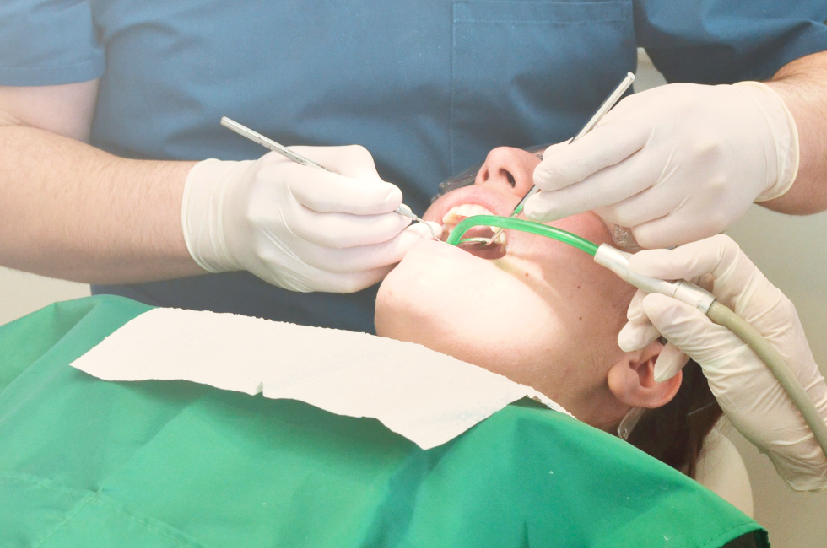
by Bay Dental | Feb 16, 2016 | Uncategorized
It’s strange to hear about our teeth having roots – aren’t those normally reserved for things like plants? Just like a tree’s roots keep it in place in the earth, our teeth’s roots keep them anchored in our mouths – an important job! The first three teeth in both the top and bottom job have only one root. The fourth and fifth teeth have one root on the bottom jaw (usually) and the top fourth tooth usually has two small roots, like the tops of rabbit ears. The fifth tooth usually has one root. The sixth and seventh teeth (molars) usually have two roots on the bottom jaw and three roots on the top jaw. The third molar (wisdom tooth) demonstrates a lot of variability, from 1-3 roots. Usually, the lower wisdom teeth have...

by Bay Dental | Feb 16, 2016 | Uncategorized
We hear a lot about fluoride – it’s likely in your toothpaste and maybe even in your drinking water. What we don’t often hear, however, is what this useful element actually does for our teeth. To start with, our teeth are covered in a mineral called enamel. Enamel has a crystalline structure to it called hydroxyapatite. Hydroxyapatite has a certain strength to it that helps to protect our teeth and keep them healthy. When acids from the foods we eat attack hydroxyapatite, it can break it down and begin the decay process. This is where fluoride comes in. When fluoride interacts with a tooth there is a change in the crystal. A new crystal, called fluorapatite, is formed. Fluorapatite is actually stronger than hydroxyapatite! This means the tooth, with its new crystalline structure, is more resistant to acid attack and therefore, decay. With use of fluoride, there is approximately a 50% reduction in decay. I know there might be some chemistry folks out there who are interested in how this happens – in fact, the OH (Hydroxyl ion) in hydroxyapatite is replaced with a Fl (Fluoride ion) to make fluorapatite, which has a higher bond strength. If you have any questions about keeping your teeth healthy give us a visit at Bay Dental located on West Georgia downtown Vancouver. Feel free to give us a call at 604-569-0099 to book an appointment....

by Bay Dental | Jan 6, 2016 | Uncategorized
There are many possible causes. You may have one of these or a combination of a few. Aging Aging is correlated with increasing recession, not many 20 year olds have receding gums. Universally all 70 year olds will. Thin bio-type. This is the number one causative condition that pre-disposes to gum recession. It means very thin gum tissue. This is genetically pre-determined so not something that you can control. People with thin (gum tissue) biotype will usually experience a lot of recession on many teeth. History of orthodontic treatments (braces). It is very common to see recession (frequently on tooth #4) after orthodontic treatment. It is likely that this tooth is moved outward and the gum is stretched thin over it and then recedes. Incorrect bite. When a tooth is not precisely in the correct position the tooth and supporting tissues (gum and bone) will receive forces that are potential causes of gum and bone recession. Overaggressive Brushing Overaggressive (scrubbing) tooth brushing. Incorrect muscle attachment There is a small band of tissue (called the frenum) that sits between the lip and gums. There are approximately six in a person’s mouth. If this frenum is attached to the gum in a location that is too high (towards the gum line) It can actually pull the gum tissue away from the tooth and cause it to recede. These are some common causes for receding gums. There are various treatments depending on the cause. If you are concerned about the health of your gums contact Bay Dental today, we are conveniently located on West Georgia downtown Vancouver....

by Bay Dental | Oct 29, 2015 | Uncategorized
Flossing regularly will keep your gums healthy and keep cavities at bay. Although frequent and precise flossing is an ideal way to keep your gums healthy by reducing inflammation and reduce susceptibility to cavities, in reality not many people do it. We are in agreement that regular flossing is essential for oral health, especially when done correctly. However, sometimes it seems as though we are battling human nature. Many patients find it hard to pick up a habit of flossing regularly. What alternatives are there to flossing? At Bay Dental Centre in downtown Vancouver, we promote the use of a Waterpik in place of flossing. Is a Waterpik better for your teeth than flossing? What it really comes down to is which you would be more likely to do on a regular basis. Research has shown using a Waterpik is very effective in reducing gum inflammation. Patient’s compliance with the Waterpik is greater than with flossing. Maybe because it is easier, whatever the reason the waterpik is a very useful tool to keep a healthy and fresh feeling mouth. It is a viable replacement for flossing. Waterpiks are available at Costco, Shoppers, and London Drugs. For more information on flossing or healthy habits for your oral health, book an appointment at Bay Dental on West Georgia, downtown...

by Bay Dental | Oct 29, 2015 | Uncategorized
There are different schools of thought regarding wisdom teeth. At our dental office located downtown Vancouver, we throughly discuss options with each patient, so the best decision for their individual case. An aggressive approach would suggest that all wisdom teeth should be removed. This might be analogous to saying all tonsils should be removed, therefore not necessary. Let’s look at some problems associated with wisdom teeth which are actually third molars: Plaque Retention Plaque retention: the wisdom teeth are very far back in the mouth and difficult to clean with a toothbrush. Cavity in Wisdom Tooth If a cavity develops it is difficult for the dentist to get a good filling done because of challenging access. Chance of an Infection If a wisdom tooth is not grown completely into your mouth there will be a chance for bacteria to live around it and cause an infection. Wisdom Tooth Not Growing If a wisdom tooth is stuck in your jaw and not growing into your mouth it can sometimes become infected or have a cyst (fluid filled) develop around it Angulated Wisdom Tooth An angulated wisdom tooth can cause a cavity on the backside of its neighboring tooth. Once these potential problems are taken into consideration, a decision for what is best (removing or not removing) can be made. If you would like to discuss your options further please contact us to visit our downtown Vancouver...

by Bay Dental | Jul 17, 2015 | Uncategorized
Our downtown Vancouver dental practice, Bay Dental, prides ourselves on giving our patients the tools they need to maintain a healthy smile. The Maydent Plan is an annual membership that gives patients access to affordable dental maintenance services. This is not a dental plan, but a program that gives our patients savings through group membership. Maydent Dental Plan FAQs What is included in the Maydent Plan? Each annual membership includes two visits to Bay Dental.* The Maydent Plan includes the following services at no extra charge: Two Exams (Valued at $70) Two Bitewing X-rays (Valued at $24) Two Cleanings* (Valued at $265) Two Fluoride treatment (Valued at $28) Oral Hygiene instruction (Valued at $32) Total value of $419 at regular prices. Savings of $119 when purchasing Maydent Plan. * continuing care visit must be within 8 months to qualify for a 2nd Maydent appointment. Is this an insurance plan? No, this is a program that gives patients savings on exams, cleanings, fluoride treatments, etc. How much does it cost? The Maydent Plan costs $300 per year for adults and $175 per year for children. By buying into the plan, you are covered for a wide selection dental treatments including exams, cleanings, x-rays, fluoride, and more. These are preventative services that build a solid foundation for your dental needs throughout the year. Why should I join? The Maydent Plan provides savings on preventive dentistry services including cleanings, fluoride treatments, exams, and more. This will help you maintain healthy teeth and gums, which will ensure restorative work lasts longer and gum disease is monitored and controlled. Enrolment in the plan gives you a built-in motivational...








Recent Comments